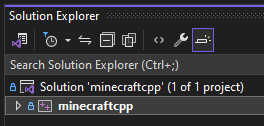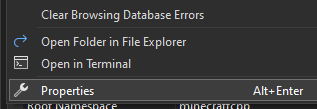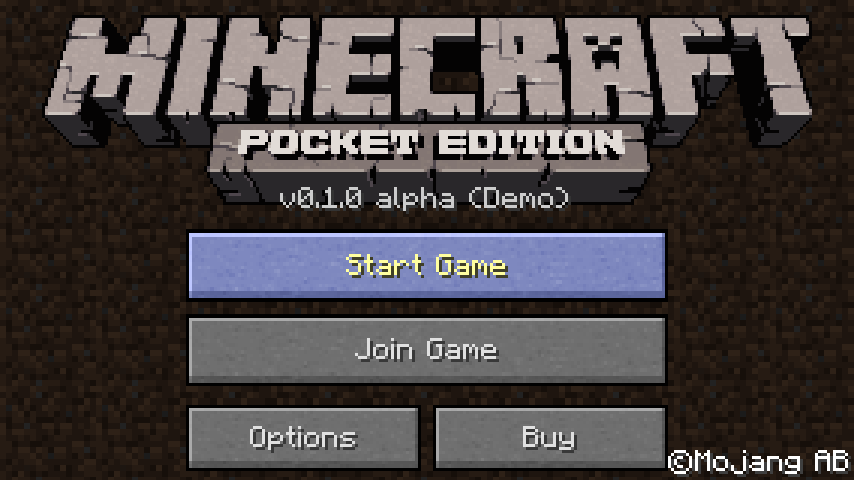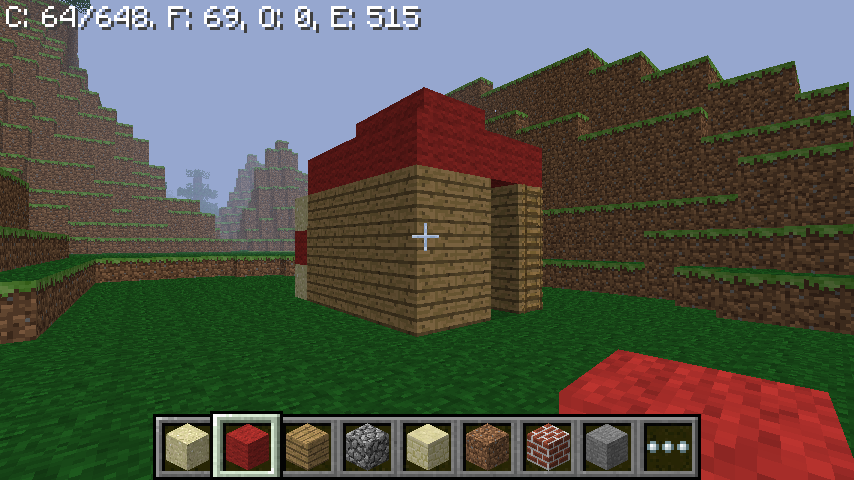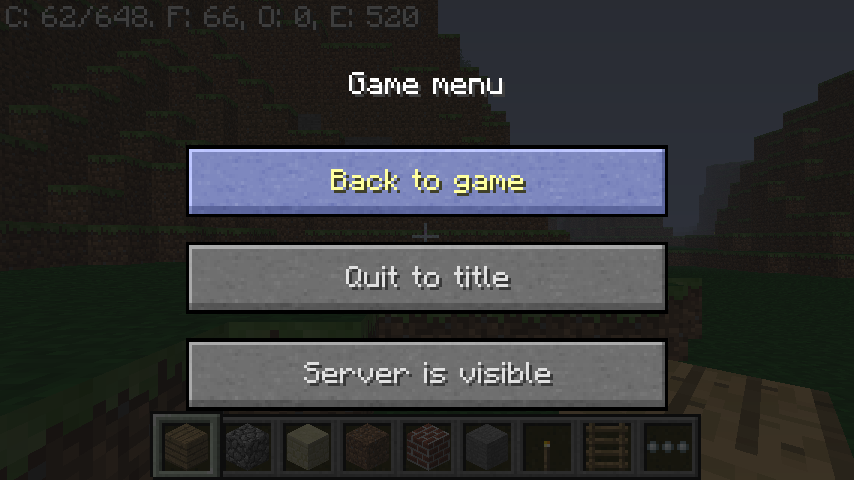* ExternalFileLevelStorageSource: add workaround for d_type on Haiku * raknet: FileList: do not include io.h on Haiku * raknet: SocketLayer: add sockio.h for Haiku * cmake: link -lnetwork on Haiku * readme: add Haiku build dependencies * cmake: use link_libraries instead of add_link_options * ExternalFileLevelStorageSource: use scary stdstring instead of char |
||
|---|---|---|
| .github/workflows | ||
| compat | ||
| game | ||
| platforms | ||
| screenshots | ||
| source | ||
| thirdparty | ||
| tools | ||
| .gitattributes | ||
| .gitignore | ||
| .gitmodules | ||
| build-wasm.bat | ||
| build-wasm.sh | ||
| GameMods.hpp | ||
| LICENSE.txt | ||
| Makefile | ||
| README.md | ||
| TODO.md | ||
ReMinecraftPE
This project aims to create a custom Minecraft experience based on Minecraft: Pocket Edition as of 2011. It's based on the mcpe01_canada.apk build of the game.
Its goals are:
- To add Quality-of-Life features to Minecraft: Pocket Edition, such as a brighter color gamut, an in-game options menu, etc.
- To add features that were in Minecraft Alpha and the early Betas in 2011. (before and during Minecraft PE's development - this excludes hunger, for example, as it was added in Beta 1.8)
- To keep the source code layout similar to the original Minecraft PE (reconstructed from clues hidden within certain versions of the game, such as the 0.1.0 touch prototype/debug build)
- To port the game to more platforms, such as Windows (including older versions), Linux, WebGL, Android, and
macOS. Currently we have ports for:
- Windows XP-11
- Linux
- WebGL
- macOS (port by BrentDaMage)
- Xbox 360 (incomplete; port by BrentDaMage)
- HaikuOS
We will not do the following:
- Add features added in or after Java Edition Beta 1.8
- Backport features from versions newer than 0.9.0
- Add The Nether or The End (probably)
- Add Herobrine
- Add support for Minecraft Java or Minecraft Bedrock servers. (although LAN play with original MCPE clients will be supported for as long as possible)
- Modify the project structure
Note: The original mcpe01_canada.apk does not work on newer Android devices. A port of this likely will.
This is the main modded version. For the original decompilation, see ReMinecraftPE/mcped
License information
This project is licensed under the BSD 1 clause license. However, it contains third party software with different but compatible licenses:
WANT TO HELP?
Want to help this project? Here's a list of things left to do.
DISCLAIMER
This project requires you to have a copy of the mcpe01_canada.apk (sha256 of the libminecraftpe.so
inside: 74b1d3b51a174c4dcaaa58d2bbdf7a4f4c9cfe5f2aeec4844427c2b8f1124343), before you can build.
Setup
Before trying to build:
- Run the following
gitcommands, or perform the following actions with Git:
git submodule init
git submodule update
This fetches the three dependencies we have:
- Load the sound assets into the
sound_data/folder in the root of the project by running the following command:
tools/grabsounds.py /path/to/the/mcpe01_canada/lib/armeabi-v7a/libminecraftpe.so.
After that, prepare the assets folder from mcpe01_canada.apk. You will need it for the platform specific build.
Building
Windows
The project is configured to target Windows XP by default by using "v141_xp" build tools. If you would like to build with Windows XP support, please follow the guide here to obtain the build tools via the Visual Studio installer.
If you would like to strictly target more modern versions of Windows, you can change the build toolset by doing the following:
- Right-click the project and click "Properties".
-
Click the dropdown for the "Platform Toolset" property and select "Visual Studio 2022 (v143)" or newer.
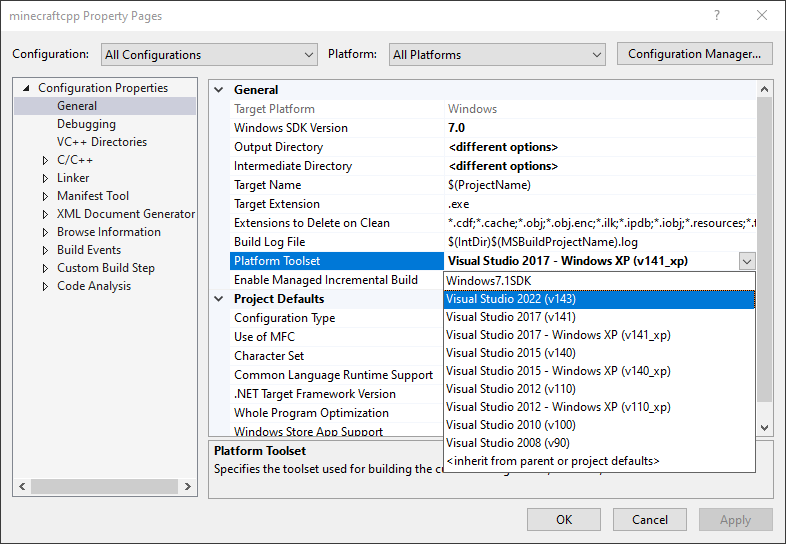
-
Click "Apply".
Install the DirectX SDK (June 2010), unless:
- You opt to use OpenAL instead (but that will require some hacking)
- You are using the latest platform toolset
Once you have the proper build tools installed (v140_xp or newer), you can now build it.
After building, place the assets folder you have prepared in the working directory of the output executable.
(if running from VS, it's in game/, otherwise, where your executable is)
WebAssembly
Make sure you have CMake and Ninja installed. On Windows, the ninja executable must be in your PATH.
On Linux, the package names are cmake and ninja-build respectively if you are using apt.
The game will use the assets from within the game/ directory. So put your assets there if you want to build
for wasm. Then run the build-wasm script corresponding to your platform (-.sh on linux/WSL, -.bat on
windows).
The output files will be in ./wasm/dist, but you need to upload them to a web host (localhost works too) to
use. (problem with Emscripten)
NOTE: If you are using nginx, make sure the *.wasm file is served as application/wasm, and not
application/octet-stream. This can be done by opening /etc/nginx/mime.types as root and adding
application/wasm wasm; to the types block.
Linux
This project uses CMake on Linux. Just like WebAssembly, the game assets must be placed in the game/ directory.
Dependencies (Ubuntu/Debian)
build-essential(C/C++ Toolchain)cmake(CMake)ninja-build(Ninja)libsdl2-dev(SDL2)libopenal-dev(OpenAL)libpng-dev(LibPNG)
How To Build
cd platforms/sdl
mkdir build && cd build
cmake -GNinja ..
cmake --build .
# Run
./reminecraftpe
HaikuOS
Dependencies
libsdl2_devel(SDL2)glu_devel mesa_devel(Mesa)cmake(CMake)ninja(Ninja)
How To Build
- Same as for Linux.
Have seams when playing?
I've had texture seams when playing Minecraft Classic, ClassiCube and this recreation of Minecraft PE, on a fresh new laptop. If seams bother you, and you are using an NVIDIA graphics card, go to the NVIDIA Control Panel, then in "Manage 3D Settings", change "Antialiasing - Mode" to "Application Controlled".
Notes on assets
The terrain.png and related textures appear to have stayed the same between the E3 demo and the final release for Xperia PLAY. It appears to have been fetched before Java Edition Beta 1.4's release. This can be seen because the cookie's texture is missing. (it was added in Java Edition Beta 1.4)
Screenshots (from the decomp)
Enhancements
All enhancements (and more) that are available in the decomp version are turned on by default, but only some of them can be disabled, and the GameMods.hpp file used to control them is deprecated and will be removed. Check the decomp version's repository for a partial list of enhancements that were added to the game.
